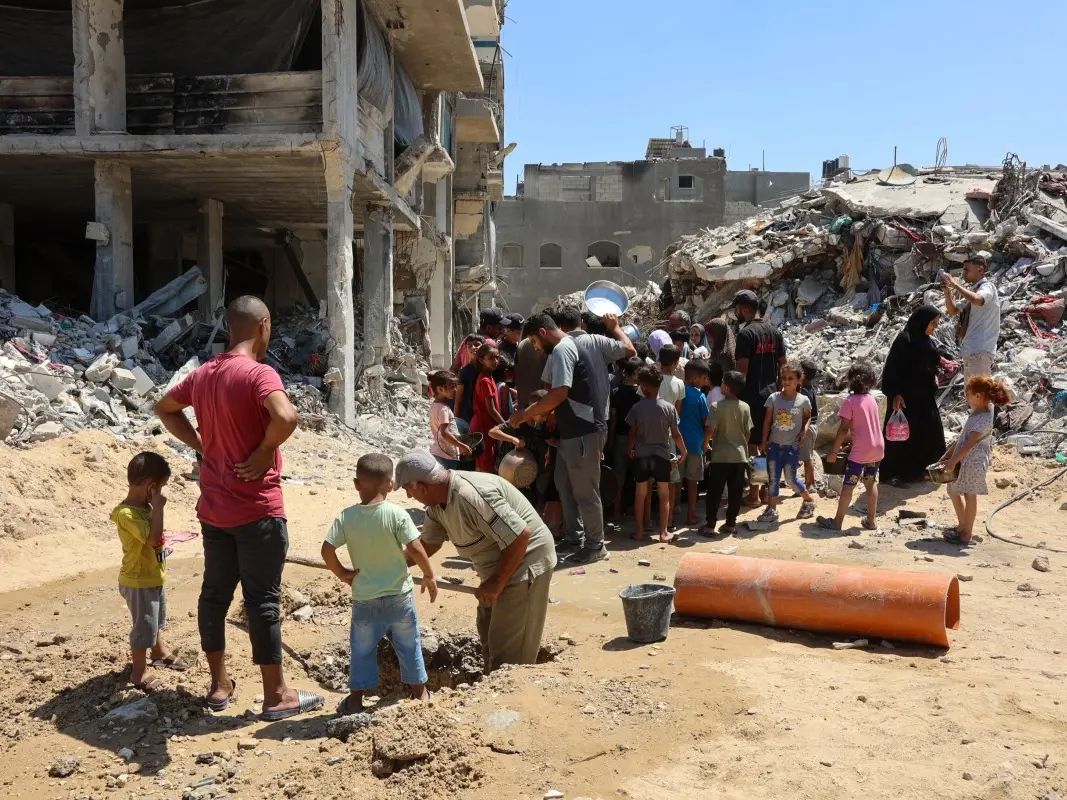Gaza Rescue Services Deputy Director Mohamed Morsi Reportedly Killed in Israeli Airstrike

The deputy director of Gaza’s Civil Emergency Service, Mohammed Morsi, and four members of his family were killed in an Israeli airstrike on their home in Jabalia, health officials in Gaza reported.
Morsi’s death underscores the relentless toll the conflict has taken on emergency responders and civilians alike, bringing the total number of Civil Emergency Service members killed by Israeli fire since October 7 to 83. This tragic Israeli airstrike incident highlights the perils faced by those on the front lines of humanitarian efforts in Gaza, where emergency workers often find themselves targets amid the chaos.
The Israeli airstrike in Jabalia is just one of many recent attacks as Israel intensifies its military campaign in Gaza. Residents reported that Israeli forces had also demolished several homes in the Zeitoun suburb of Gaza City, located about 5 kilometres from Jabalia.
The destruction after the Israeli Airstrike has left many families displaced, adding to the humanitarian crisis that has engulfed the territory. Medical teams, overwhelmed by the scale of the devastation, have struggled to respond to the mounting distress calls from residents trapped under rubble. Many of these individuals are severely wounded and desperately need medical assistance, yet the continuous shelling hampers rescue operations.
“We hear constant bombing in Zeitoun. They are blowing up houses; the sound of explosions and the roaring of tanks are relentless. Drones circle endlessly overhead. We haven’t slept,” said one resident of Gaza City, who lives about a kilometre from the affected area. The fear of further strikes and the uncertainty of what each day may bring have left many in Gaza in a state of perpetual anxiety, with no safe place to seek refuge.
Also Read: General Strike In Israel Begins As A Protest For Pressuring Government For Gaza Hostage Deal
As the conflict drags on, both Israel and Hamas continue to trade blame for the collapse of ceasefire negotiations mediated by Qatar, Egypt, and the United States. Diplomatic efforts to broker a truce have repeatedly faltered amid deep mistrust and opposing demands.
The U.S. is preparing to present a new proposal in hopes of finding a diplomatic resolution, but prospects remain bleak as substantial gaps between the sides’ positions persist. While mediators work behind the scenes, the violence shows no sign of abating, and the humanitarian situation in Gaza continues to deteriorate.
Despite the ongoing conflict including this recent Israeli airstrike, the United Nations, in collaboration with local health authorities, has been pressing ahead with a critical vaccination campaign aimed at protecting children in Gaza from a potential polio outbreak.
The campaign was extended by an extra day in southern Gaza before it moved to the north, in a race against time to inoculate 640,000 children following the detection of the first polio case in the region in 25 years.
The vaccination drive has proceeded under the shadow of conflict, with brief pauses in fighting allowing health workers to reach children in need. According to UN officials, more than half of the targeted children in southern and central Gaza have already received the first dose of the vaccine.
A second round of vaccinations is planned to take place four weeks later. Despite the immense challenges, the campaign offers a glimmer of hope amid the turmoil, aiming to prevent a health crisis that would further exacerbate the dire conditions facing Gaza’s young population.
The current escalation of violence and Israeli airstrike was sparked on October 7 when Hamas launched a surprise attack on Israel, killing 1,200 people and taking approximately 250 hostages, according to Israeli sources. Israel responded with a massive military offensive on Gaza, which, according to the Palestinian Health Ministry, has resulted in the deaths of 40,972 civilians.
Also Read:UN Launches Polio Vaccination Campaign for Over 640,000 Children in Gaza
The war displaced nearly the entire population of 2.3 million palestinians. The scale of destruction has also triggered a hunger crisis, with international bodies warning of potential famine as food and medical supplies dwindle.
The conflict has sparked intense international scrutiny, with allegations of war crimes and genocide filed against Israel at the World Court (ICJ), accusations that the Israeli government vehemently denies.
The Palestinian Health Ministry does not distinguish between combatants and non-combatants in its casualty reports, although health officials insist that the majority of the dead are civilians, including many women and children. Israel, meanwhile, claims that at least a third of those killed in Gaza after Israeli Airstrike are militants, and reports that 340 of its soldiers have been killed in the conflict.
As the world watches, the humanitarian catastrophe in Gaza continues to unfold, with no clear end in sight. Both sides remain entrenched in their positions, and as diplomatic efforts stall, the cost of the conflict grows daily, measured not only in numbers but in the lives irrevocably altered by the relentless cycle of violence.
LATEST NEWS
DISCOVER MORE






